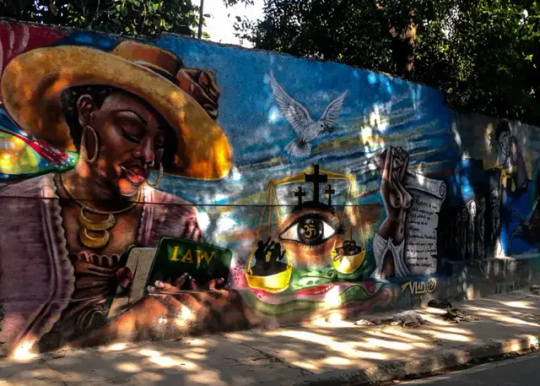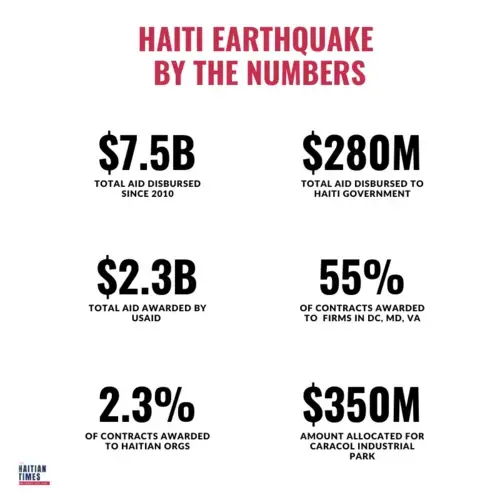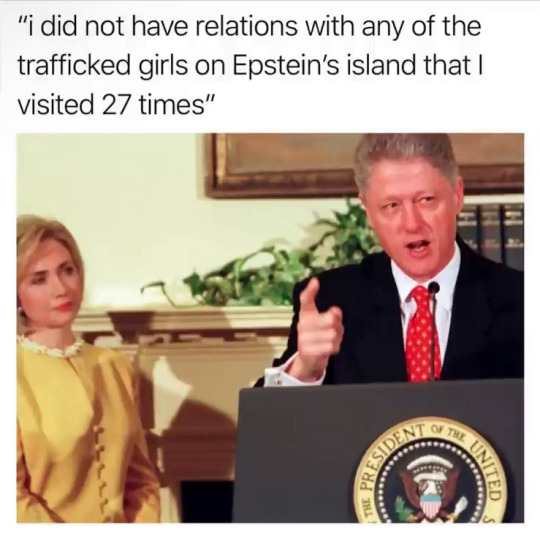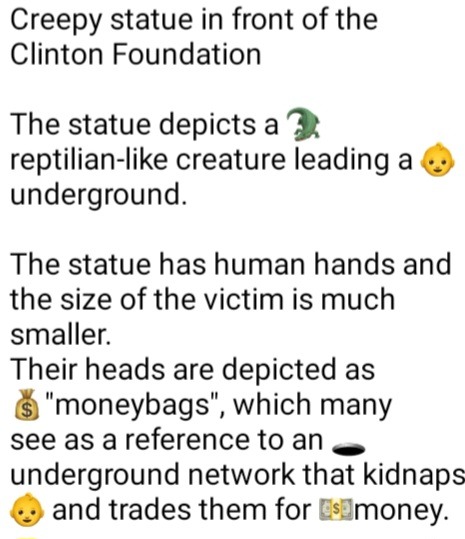#the clinton foundation
Text
The Clinton Suicide Squad
23 notes
·
View notes
Text

https://americasbestpics.com/picture/hApUEd7c9?s=u
47 notes
·
View notes
Text

the Clintons did this to Haiti
2 notes
·
View notes
Text
Part 2
Clintons’ Secret Pedophile and Cannibal Club in Haiti Exposed By Locals.
The Clintons have long considered Haiti to be their personal playground where they can indulge in their wildest fantasies with close friends from the global elite, according to Haitians who allege the Democrat power couple are involved in a Satanic cannibal club in which children are ritually abused and their flesh eaten.
According to multiple eyewitnesses in Haiti, the Satanic club has become the new Bohemian Grove for the jetsetting globalist elite, with private jets regularly landing in Port-au-Prince before the passengers are whisked away to their secret hideout in the jungle where unspeakable horrors involving children have been documented by local investigators.
The locals call this place “Clinton’s den” and generations of local children have been taught to be terrified of Bill and Hillary who are viewed as evil incarnate due to the depraved nature of the company they keep, as violent cannibals and pedophiles stalk the island with impunity. 🤔
#pay attention#educate yourselves#educate yourself#knowledge is power#reeducate yourself#reeducate yourselves#think about it#think for yourselves#think for yourself#do your homework#do some research#do your own research#ask yourself questions#question everything#clinton foundation#lies exposed#news#save the children#save our children#save humanity#crimes against humanity#child trafficking#government corruption
363 notes
·
View notes
Text
the clinton foundation asked karlie kloss how she manages to choose optimism in the face of today’s challenges: this is her answer 🤍
6 notes
·
View notes
Text

Instagram Tassisomoza
20 notes
·
View notes
Link
“Upon receipt of unevaluated intelligence information from Australia, the FBI swiftly opened the Crossfire Hurricane investigation. In particular, at the direction of Deputy Director Andrew McCabe, Deputy Assistant Director for Counterintelligence Peter Strzok opened Crossfire Hurricane immediately. Strzok, at a minimum, had pronounced hostile feelings toward Trump.”
“The matter was opened as a full investigation without ever having spoken to the persons who provided the information. Further, the FBI did so without (i) any significant review of its own intelligence databases, (ii) collection and examination of any relevant intelligence from other U.S. intelligence entities, (iii) interviews of witnesses essential to understand the raw information it had received or (iv) using any of the standard analytical tools typicallv employed by the FBI in evaluating raw intelligence,” the report concluded.
“Had it done so … the FBI would have learned that their own experienced Russia analysts had no information about Trump being involved with Russian leadership officials, nor were others in sensitive positions at the CIA, the NSA, and the Department of State aware of such evidence concerning the subject. In addition, FBI records prepared by Strzok in February and March 2017 show that at the time of the opening of Crossfire Hurricane, the FBI had no information in its holdings indicating that at any time during the campaign anyone in the Trump campaign had been in contact with any Russian intelligence officials,” it said.
“In the eighteen months leading up to the 2016 election, the FBI was required to deal with a number of proposed investigations that had the potential of affecting the election. In each of those instances, the FBI moved with considerable caution. In one such matter… FBI Headquarters and Department officials required defensive briefings to be provided to Clinton and other officials or candidates who appeared to be the targets of foreign interference,” it said. “In another, the FBI elected to end an investigation after one of its longtime and valuable CHSs went beyond what was authorized and made an improper and possibly illegal financial contribution to the Clinton campaign on behalf of a foreign entity as a precursor to a much larger donation being contemplated.”
“And in a third, the Clinton Foundation matter, both senior FBI and Department officials placed restrictions on how those matters were to be handled such that essentially no investigative activities occurred for months leading up to the election. These examples are also markedly different from the FBI’s actions with respect to other highly significant intelligence it received from a trusted foreign source pointing to a Clinton campaign plan to vilify Trump by tying him to Vladimir Putin so as to divert attention from her own concerns relating to her use of a private email server,” it said.
“Within days after opening Crossfire Hurricane, the FBI opened full investigations on four members of the Trump campaign team: George Papadopoulos, Carter Page, Paul Manafort, and Michael Flynn. No defensive briefing was provided to Trump or anyone in the campaign concerning the information received from Australia that suggested there might be some type of collusion between the Trump campaign and the Russians, either prior to or after these investigations were opened. Instead, the FBI began working on requests for the use of FISA authorities against Page and Papadopoulos.”
“Our investigation determined that the Crossfire Hurricane investigators did not and could not corroborate any of the substantive allegations contained in the Steele reporting. Nor was Steele able to produce corroboration for any of the reported allegations, even after being offered $1 million or more by the FBI for such corroboration.
“The FBI learned that Steele relied primarily on a U.S.-based Russian national, Igor Danchenko, to collect information that ultimately formed the core allegations found in the reports. Specifically, our investigation discovered that Danchenko himself had told another person that he (Danchenko) was responsible for 80% of the ‘intel’ and 50% of the analysis contained in the Steele Dossier.”
“In December 2016, the FBI identified Danchenko as Steele’s primary sub-source. Danchenko agreed to meet with the FBI and, under the protection of an immunity letter… the FBI conducted multiple interviews of Danchenko regarding, among other things, the information he provided to Steele,” it said. “Danchenko was unable to provide any corroborating evidence to support the Steele allegations, and further, described his interactions with his sub-sources as ‘rumor and speculation’ and conversations of a casual nature. Significant parts of what Danchenko told the FBI were inconsistent with what Steele told the FBI during his prior interviews in October 2016 and September 2017. At no time, however, was the FISC informed of these inconsistencies. Moreover, notwithstanding the repeated assertions in the Page FISA applications that Steele’s primary sub-source was based in Russia, Danchenko for many years had lived in the Washington, D.C. area.”
“The FBI knew in January 2017 that Danchenko had been the subject of an FBI counterintelligence investigation from 2009 to 2011. In late 2008, while Danchenko was employed by the Brookings Institution, he engaged two fellow employees about whether one of the employees might be willing or able in the future to provide classified information in exchange for money. According to one employee, Danchenko believed that he (the employee might be following a mentor into the incoming Obama administration and have access to classified information. During this exchange, Danchenko informed the employee that he had access to people who were willing to pay for classified information.”
“The FBI converted its investigation into a full investigation after learning that Danchenko (i) had been identified as an associate of two FBI counterintelligence subjects and (ii) had previous contact with the Russian Embassy and known Russian intelligence officers… at that earlier time, Agents had interviewed several former colleagues of Danchenko who raised concerns about Danchenko’s potential involvement with Russian intelligence. For example, one such colleague, who had interned at a U.S. intelligence agency, informed the Office that Danchenko frequently inquired about that person’s knowledge of a specific Russian military matter.”
You can read the report here.
#Durham report#Russia#FBI#collusion#Daily Wire#corruption#Hillary Clinton#Luke Rosiak#George Papadopoulos#John Durham#Steele dossier#Crossfire Hurricane#Clinton Foundation#Christopher Steele#Carter Page#Trump administration#Peter Strzok#Paul Manafort#Andrew McCabe#Igor Danchenko
1 note
·
View note
Text

Less than two months ago, parts of Port-au-Prince seemed like a ghost town. Streets and parks normally bustling with commerce and people were nearly empty.
Market women, who normally lined the roads selling everything from food to second-hand cellphones, were few and far between. Charred tires, piles of rocks, and makeshift barricades, the remnants of months of protests against the government, could be seen throughout the capital. The once pristine Petionville, an affluent suburb of Port-au-Prince, was barely recognizable in some parts, with trash overrunning the streets.
Over the last 18 months, Haiti has been in the throes of a perpetual cycle of protests — some violent — and unrest that has destabilized the country for weeks at a time. Years of pent-up frustration over rising inflation and basic costs of necessities on the island came to a boil during a week in July 2018, when the Haitian government nearly doubled fuel prices over night. The move, which was a condition for future aid imposed by the International Monetary Fund, sparked outrage that spilled into the streets, leaving Haiti’s capital charred by flames and fury. People were barricaded in their homes, offices, restaurants, while thousands of people took to the streets rallying against the fuel hike.
The Best Western, which permanently closed its doors on Oct. 31, loomed over Petionville as a symbolic and literal reminder of the state of affairs in Haiti. For many, the U.S.-based hotel chain’s arrival in the country had marked a positive new turn in Haiti following the January 2010 earthquake.
Now, it seems, the hopeful signs have come undone. While daily life in Haiti has always been difficult for most Haitians, the past 18 months on the island have been particularly hard. As the country finds itself in the throes of a fluctuating political, economic and social crisis, the capital city has been virtually paralyzed, with schools, businesses, and banks closed for days, if not weeks, at a time.
This was not the Haiti anyone had hoped for 10 years after the disaster.
The 7.0-magnitude earthquake that struck Haiti on Jan. 12, 2010 killed roughly 300,000 people and displaced nearly a million more. While the epicenter of the earthquake was only 16 miles from Port-au-Prince, the tremor could be felt as far away as Cuba and Venezuela. The devastation was the single greatest humanitarian crisis the small-island country had ever faced. The capital’s already fragile infrastructure was nearly decimated, while the airport and seaports were rendered inoperable. The National Assembly building and Port-au-Prince Cathedral were also destroyed.

“There was a natural expectation that things would be done differently from there on because it was such a big tragedy and the way that that tragedy unfolded was in itself a reflection of choices that were made historically in the country in terms of governance,” said Ludovic Comeau Jr., professor of economics at DePaul University and former chief economist of Haiti’s central bank.
According to Comeau, most of the country’s wealth was severely impacted by the earthquake because of the centralization of Haiti’s economy in Port-au-Prince, with damages totaling 120 percent of the country’s GDP.
“[It was] not only our hope, but almost our certainty, that things would be done differently [in Haiti] and within the next 20 years, Haiti would be an emerging economy,” Comeau said. “It’s certainly not the path we took. There’s no way Haiti will become an emerging economy by 2030.”
“This is worse than the earthquake”
Melinda Stephanie Dominique, a medical student at Quisqueya University, spent the fall semester waiting to find out when it would be safe enough for her to return to school. Instead of studying for exams and walking the halls of her campus with her classmates, she was home weighing the risks she would face if she did decide to venture out.
“We watch the news, we see the videos,” said Dominique, who has three years left in her program. “We’re not going out just like that. Especially when you can hear the bullets yourself. There’s no way to know whether you’ll be able to make it back home.”
While some schools sent notice and formally closed their doors at the height of the protests, others simply shuttered their doors because students stopped coming in. In Dominique’s case, Quisqueya University opted to suspend classes until the protests subsided.
“We don’t know what’s going to happen in this country,” Dominique said.
The political and social turmoil in the country is exacerbated by a feeling of hopelessness that has taken hold in the country, in large part due to the disappointment surrounding earthquake relief and reconstruction efforts.
For the first time in decades Haiti had the world’s attention. However the overwhelming consensus is that the Haitian government and members of the CORE Group — composed of the Special Representative of the United Nations Secretary-General, the Ambassadors of Brazil, Canada, France, Germany, Spain, the European Union, the United States of America, and the Special Representative of the Organization of American States — squandered what little chance Haiti had to emerge as a growing and stable economy.
Comeau says the last decade is one of “missed opportunities, endemic corruption sustained by an equally endemic impunity.”
“You have a situation where public officials in charge of budget in some administrations pilfer the country’s money, and there’s no accountability,” he said. “There’s this mentality that people can do whatever they want, including mismanaging and essentially embezzling public funds. You see all of this culminates in the PetroCaribe scandal.”
In 2005 Venezuela launched the PetroCaribe program that allowed Caribbean countries to buy oil at market value, with only a portion of the payment made upfront, while the remainder of the balance could be paid through a 25-year financing agreement with a 1 percent interest rate. The aim of the program was to spur development and fund social programs in recipient countries. In Haiti, however, nearly $3 billion of the PetroCaribe funds went missing, with Haitians having little to show for the billions of dollars that were poured into the country.
“There’s nothing that can be shown for that $3 billion,” Comeau said. “This is what I’m talking about when I say missed opportunities. Here you have this money from 2008 – 2017 that was available to do something great. We could have built a major hospital in every major region in the country. We could have built universities in every department. We could have improved our infrastructure and modernized, which would have attracted foreign investors. We missed all of this.”

Since the earthquake, more than $7 billion in foreign aid has been disbursed to Haiti, according to research from the Center for Economic and Policy Research.
Haitian organizations and firms, however, received just over 2 percent of the funds that had been allocated to the country.
Criticisms and accusations of fraud, mismanagement and misappropriation of funds plagued relief efforts for years, spurring accountability campaigns demanding answers to the whereabouts of billions of dollars that were meant for reconstruction efforts in Haiti.
Bill and Hillary Clinton were at the center of many scandals surrounding Haiti and the relief funds.
In the days following the earthquake, Bill was tapped as co-chair of the commission tasked with allocating relief funds, while Hillary oversaw more than $4 billion Congress earmarked recovery efforts. However, emails released through a Freedom of Information Act request, revealed officials from the Clinton Foundation — the couple’s personal philanthropic fund — were looking out for bids and proposals from the Clintons’ friends and associates. In the end, the foundation secured 34 projects in the country, including the $350 million Caracol Industrial Park project. The project led to the creation of 10,000 jobs in Haiti, instead of the 65,000 the Clintons promised.
“Billions of dollars were donated to Haiti after the earthquake and we have no idea what was done with that money,” Comeau said.
“In 10 years, nothing has changed,” Dominique said. “We didn’t move forward; we stayed static.”
For many, the current state of affairs in Haiti is worse than any damage the country suffered because of the earthquake. This was more devastating because of its “man-made” nature.
The chain of events to follow would set the stage for a Haiti that many are saying is at its lowest point ever. The Kot Kob Petrocaribe movement would highlight more than ever the endemic corruption in Haitian politics, and pave the way for the dismissal of prime ministers and eventual calls for the resignation of President Jovenel Moise. The movement, which started on Twitter, has since been co-opted and used by Haitian politicians and oligarchs to further their political interests by calling for the ouster of Moise.
Haiti’s already fragile tourism sector has been one of the biggest casualties of Haiti’s unrest. Following the earthquake, former President Michel Martelly made a big push for tourism in the country, with then-Minister of Tourism Stephanie Voulledrain leading an international branding tour, selling Haiti as an untapped tourism treasure trove.
Several fruitful projects began as part of the effective branding campaign. Airlines added flights to the country, new hotel brands were drawn to Port-au-Prince and more and more members of the Diaspora and their friends made their way to Haiti for vacation, conferences and more.
However, in a matter of months, years of work has been reversed. Best Western closed its doors. Delta ceased flights to Haiti, while other carriers significantly reduced their service to the country. Popular resorts and hotels like Decameron Indigo Beach Resort and Spa, and Karibe are virtually empty.
Searching for understanding
There are several theories as to why Haiti is in the state it is in, despite the billions of dollars in aid and donations the country received. Some point to neo-colonialism, imperialism and U.S. intervention, while others place blame on the Duvaliers, the corrupt Haitian government, or the lack of engagement among the Diaspora. The truth is, it’s a melange of it all, which is what makes imagining what comes next for Haiti so difficult.
“The Haitian-American convention did away with Haiti’s sovereignty and it’s a sovereignty that Haiti has never gotten back,” Alain Martin, director of The Forgotten Occupation, said. The documentary tells the story of the U.S. occupation of Haiti from 1915 to 1934 from the perspective of Haitian historians, authors, journalists and politicians. “To this day, nothing happens in Haiti without the say-so of the State Department.”
The Haitian-American Treaty of 1915 gave the U.S. control over Haitian finances, and the right to intervene in Haitian affairs whenever the U.S. government deemed necessary. That same year, the U.S. government placed Philippe Sudré Dartiguenave as president of Haiti, making him the first leader in the country under the U.S. occupation.
“He represents the father figure of the modern Haitian president. Ever since Dartiguenave, with maybe one or two exceptions, every president we’ve had, has been beholden to the State Department,” said Martin.
“You have to look at Haiti as a Shakespearean tragedy. Those of us who truly love Haiti and would like to see the country move forward, don’t have the physical resources to make that happen,” he said. “How can we fight against the State Department? We need allies that we simply don’t have. What the US wants to happen in Haiti is what’s going to happen.”
So what comes next for Haiti?
“The change will have to come from the U.S.,” Martin said. “We need to build a leftist movement in the U.S. that elects leaders that are going to have different policies toward Haiti. But it’s a long shot. Regardless if there were Democrats or Republicans in power in the U.S., their foreign policies toward Haiti have never changed.”
As for Moise, he at least has public support from the U.S., which is enough to keep him in power for now. Over the last three months, U.S. officials have made their way to Haiti or Haitian communities in the United States to “encourage dialogue” over the political impasse that has held the country in its grip for almost two years. Their efforts have been met with gratitude from some and with anger from others.
“There’s always a segment of Haitian society that is looking to the U.S. to be a sort of savior for the county,” Martin said. “They are incapable of seeing Haiti foster its own destiny and barely its own institutions to get the country going. It’s a subconscious collective insecurity that we do not have the capability of doing it on our own.”
In October 2019, House Speaker Nancy Pelosi and Congresswoman Frederica Wilson — who represents the largest Haitian constituency in the U.S. — participated in a roundtable discussion with members of South Florida’s Haitian community over the growing unrest in Haiti.
Ambassador Kelly Craft’s November 2019 meeting with Moise was met with anger and disapproval from Haitians over what they perceive to be U.S. interference and meddling. And just last month, Under-Secretary of State for Political Affairs David Hale met with members of the opposition and various Haitian business leaders in a closed-door meeting where he pressed for a functioning government that can work together.
“Haitians in Haiti acknowledge now that the Diaspora is the backbone of Haiti,” Comeau said. “The Diaspora is the primary source of foreign funds in the country.” In 2019 the Diaspora sent $3.5 billion to Haiti. While remittances are primarily sent from those living in the United States and Canada, more money is starting to come from Chile and Brazil, where there are growing Haitian communities.
“The Haitian government needs to think more strategically in terms of Diaspora remittances,” he said. “Most of the money sent is spent on consumption. Haiti needs to tap more systematically into the resources of the Diaspora.
We need to have Haitians in the Diaspora invest in Haiti instead of sending money.”
One of the consistent U.S. voices when it comes to Haitian / U.S. affairs has been Marco Rubio, whose comments regarding Haiti have fluctuated from supporting the will of the people calling for Moise’s ouster, to urging calm and support for Moise.
While protests had subsided and a sense of normalcy seemed to return to Haiti as the 10th anniversary of the quake approached, what happens next is uncertain, and Haitians remain discouraged.
“The earthquake came and there were so many promises to build back better,” Martin said. “Yet the earthquake is forgotten, the people who died in the earthquake are forgotten and the promises made have been forgotten.”
#Haiti#Haiti Since the Earthquake: A Decade of Empty Promises#bill clinton#hillary clinton#clinton foundation
8 notes
·
View notes
Text
The Boeing whistleblower "committed suicide". Hmmm, I wonder how much Boeing stock the Clintons and the Clinton Foundation own?
0 notes
Text
Part 1
Clintons’ Secret Pedophile and Cannibal Club in Haiti Exposed By Locals
The Clintons have long considered Haiti to be their personal playground where they can indulge in their wildest fantasies with close friends from the global elite, according to Haitians who allege the Democrat power couple are involved in a Satanic cannibal club in which children are ritually abused and their flesh eaten.
According to multiple eyewitnesses in Haiti, the Satanic club has become the new Bohemian Grove for the jetsetting globalist elite, with private jets regularly landing in Port-au-Prince before the passengers are whisked away to their secret hideout in the jungle where unspeakable horrors involving children have been documented by local investigators.
The locals call this place “Clinton’s den” and generations of local children have been taught to be terrified of Bill and Hillary who are viewed as evil incarnate due to the depraved nature of the company they keep, as violent cannibals and pedophiles stalk the island with impunity. 🤔
#pay attention#educate yourselves#educate yourself#knowledge is power#reeducate yourself#reeducate yourselves#think about it#think for yourselves#think for yourself#do your homework#do some research#do your own research#ask yourself questions#question everything#clinton foundation#lies exposed#save the children#save our children#save humanity#crimes against humanity#government corruption#child trafficking
326 notes
·
View notes
Text

1 note
·
View note


